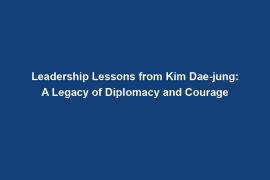Hey there, readers! Today, we’re going to dive into the fascinating world of leadership and explore some valuable lessons we can learn from Moon Jae-in, the President of South Korea.
You may have heard of Moon Jae-in in the news, but do you know the inspiring story behind his journey to the presidency? With a background shaped by adversity and challenges, Moon Jae-in exemplifies the power of resilience in leadership. He’s like that friend who never gives up, no matter what life throws their way.
From navigating political turmoil to dealing with international crises, Moon Jae-in has faced it all with a sense of unwavering determination. We’ll take a closer look at how his resilience has not only helped him weather the storm but also inspired others to stay strong in the face of adversity.
So, grab a cup of coffee and join me as we explore the world of leadership through the lens of Moon Jae-in’s remarkable resilience. Get ready to be inspired and motivated to tackle any challenges that come your way!
Resilience in Leadership
When it comes to leadership, resilience is a trait that can truly set a great leader apart from the rest. Moon Jae-in, the President of South Korea, exemplifies this quality in spades. But where does this resilience come from, and how has it shaped his leadership style?
Before becoming President, Moon Jae-in’s background included working as a human rights lawyer and later serving in the military. These experiences undoubtedly played a role in shaping his resilience, as he faced numerous challenges and setbacks along the way to the presidency.
One clear example of Moon Jae-in’s resilience is his response to the COVID-19 pandemic. When the virus hit South Korea hard, he acted swiftly and decisively, implementing widespread testing and tracing measures that helped to contain the spread. Despite facing criticism and challenges, he remained steadfast in his approach, ultimately guiding the country through the crisis.
But resilience isn’t just about bouncing back from adversity—it’s also about inspiring and motivating others to do the same. Moon Jae-in’s ability to stay strong in the face of challenges has undoubtedly inspired the people of South Korea to do the same, fostering a sense of unity and determination in the face of uncertainty.
So, what can we learn from Moon Jae-in’s resilience as a leader? It’s clear that having the grit and determination to face challenges head-on is essential for any leader. By staying resilient in the face of adversity, we can not only overcome obstacles ourselves but also inspire those around us to do the same.
Diplomacy in Leadership
Now that we’ve explored Moon Jae-in’s resilience, let’s delve into his approach to diplomacy and international relations. As the President of South Korea, Moon Jae-in has made significant strides in building relationships with other countries and promoting peace on a global scale.
Moon Jae-in’s Diplomatic Approach
One of the key characteristics of Moon Jae-in’s leadership style is his commitment to diplomacy. He believes in resolving conflicts through dialogue and negotiation rather than resorting to aggression. This approach has helped him navigate complex geopolitical issues and build alliances with countries around the world.
Key Diplomatic Achievements
During his presidency, Moon Jae-in has achieved several diplomatic successes that have enhanced South Korea’s standing on the world stage. One notable example is his role in facilitating peace talks between North Korea and the United States. His efforts to bridge the gap between these two countries have been commended by international leaders and have helped de-escalate tensions in the region.
In addition, Moon Jae-in has prioritized strengthening relationships with key partners such as the United States, Japan, and China. By fostering cooperation and collaboration with these countries, he has been able to address mutual challenges and promote regional stability.
Significance of Effective Diplomacy
Effective diplomacy is a crucial component of leadership, especially in today’s interconnected world. By engaging in constructive dialogue with other nations, leaders can build trust, resolve conflicts, and promote mutual understanding. Moon Jae-in’s success in diplomacy serves as a model for how leaders can work together to achieve common goals and create a more peaceful world.
As we continue to navigate a complex and ever-changing global landscape, the importance of effective diplomacy in leadership cannot be overstated. By following Moon Jae-in’s example and prioritizing diplomacy in their own leadership roles, individuals can contribute to a more harmonious and prosperous future for all.
Stay tuned for the conclusion where we recap the key leadership lessons from Moon Jae-in’s resilience and diplomacy!


